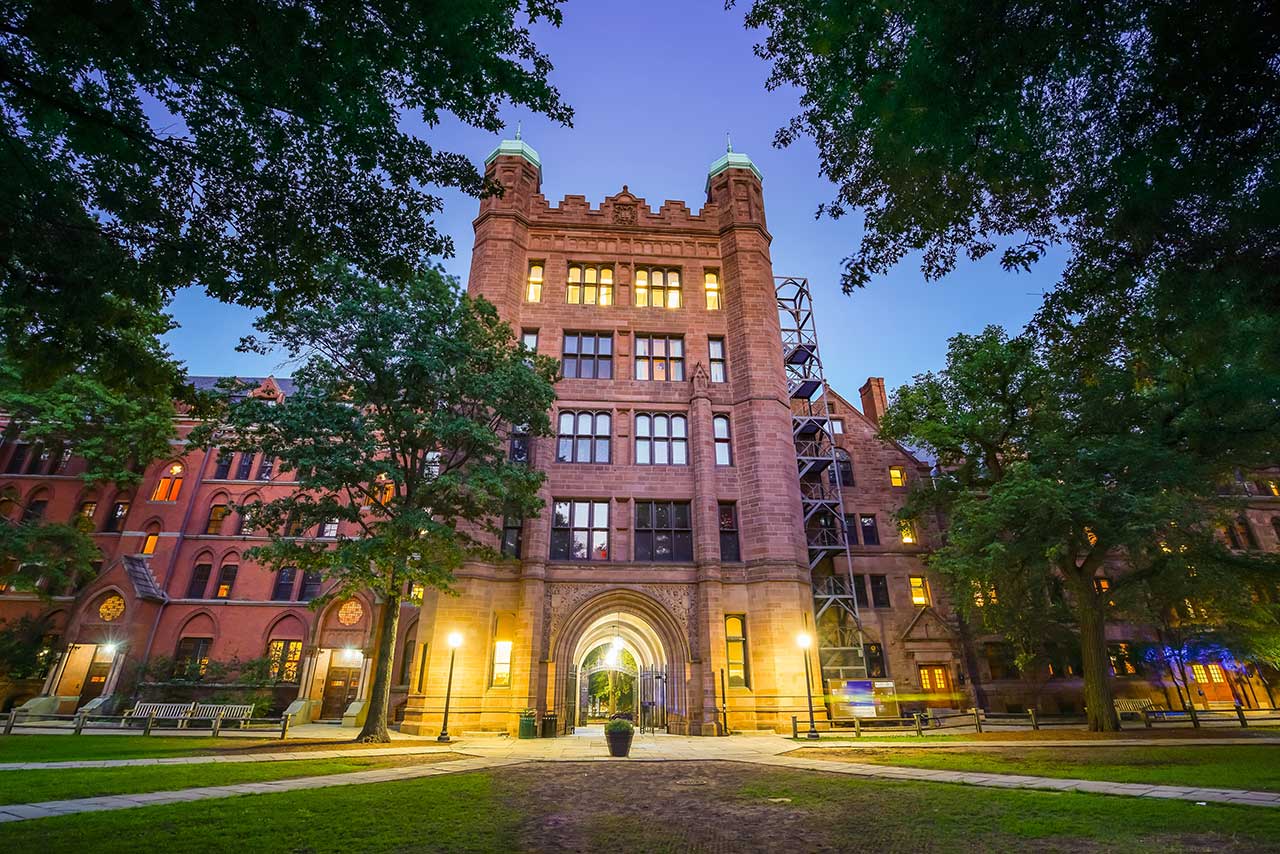You’ve probably heard of the Military-Industrial Complex before — an immense military established and large arms industry with massive economic and political influence throughout our governments.
But have you heard of the Education-Industrial Complex? It’s also an immense bureaucratic establishment and large education product and assessment industry with massive economic and political influence in our governments.
President Eisenhower’s famous 1961 farewell address warning about the power of the military-industrial complex could just as easily be applied to the education-industrial complex:
This conjunction of an immense
militaryeducation establishment and a largearmslearning assessment industry is new in the American experience. The total influence — economic, political, even spiritual — is felt in every city, every statehouse, every office of the federal government. We recognize the imperative need for this development. Yet we must not fail to comprehend its grave implications. Our toil, resources and livelihood are all involved; so is the very structure of our society. In the councils of government, we must guard against the acquisition of unwarranted influence, whether sought or unsought, by themilitary-industrialeducation-industrial complex. The potential for the disastrous rise of misplaced power exists and will persist. We must never let the weight of this combination endanger our liberties or democratic processes.
Education’s Big Challenge:
The biggest challenge facing most countries today is their antiquated education systems.
The United States was once the technology leader of the world but the country is now trailing behind China in numerous technologies, including 5G networks, drones, batteries, solar energy, and cryptocurrencies.
It’s not just the United States that is struggling, schools are stuck in the 20th-century mindset of standardization and obedience that crushes curiosity and creativity in nearly every part of the world.
While many parents worry if they will ever be able to afford to get their children a good education — I’m a contrarian — I believe that education will actually become much more inexpensive and accessible.
The future of education will be decentralized and that means the future of learning is better than ever.
Today’s Schools Are Designed To Solve Yesterday’s Problems:
The traditional system of public schooling with a standardized curriculum and an obsession with ranking and grading students was designed in the industrial age and is now outdated and ineffective.
We need to upgrade our education system for the 21st-century world we live in today and I think it should be based on empowering self-directed, passion-driven learning.
Here Are Some Good Quotes About The Education-Industrial Complex:
1. “Our schools are … factories in which the raw products (children) are to be shaped and fashioned …. And it is the business of the school to build its pupils according to the specifications laid down.”
― Ellwood P. Cubberley, Dean of Stanford’s School of Education
2. The aim of public education is not to fill the young of the species with knowledge and awaken their intelligence. Nothing could be further from the truth. The aim is simply to reduce as many individuals as possible to the same safe level, to breed and train a standardized citizenry, to put down dissent and originality.
― H.L. Mencken
3. “What do I mean when I talk about transformational productivity reforms that can also boost student outcomes? Our K–12 system largely still adheres to the century-old, industrial-age factory model of education. A century ago, maybe it made sense to adopt seat-time requirements for graduation and pay teachers based on their educational credentials and seniority. Educators were right to fear the large class sizes that prevailed in many schools. But the factory model of education is the wrong model for the 21st century.”
– Arne Duncan, US Secretary of Education in 2010
4. Our ‘education’ establishment is very much about preserving a multi-hundred-billion-dollar spending machine. Corporations make tremendous profit from selling high tech hardware and software to virtually every school district in the nation. Textbook companies and testing companies and education consulting companies and pension investment advising companies and public relations firms and bond dealers. Then there are the politicians who get campaign contributions from the above mentioned special interests and the ‘educrat’ administrators who make hundred thousand dollar a year salaries.
― Dave Chandler
5. “Our large schools are organized like a factory of the late 19th century: top down, command control management, a system designed to stifle creativity and independent judgment.’
― David T Kearns, CEO of Xerox
6. “School is the advertising agency which makes you believe that you need the society as it is.”
― Ivan Illich
7. “There is, it seems, more concern about whether children learn the mechanics of reading and writing than grow to love reading and writing; learn about democracy than have practice in democracy; hear about knowledge… rather than gain experience in personally constructing knowledge… see the world narrowly, simple and ordered, rather than broad complex and uncertain.”
― Vitto Perrone, Letter to Teachers
8. “The idea that the majority of students attend a university for an education independent of the degree and grades is a hypocrisy everyone is happier not to expose. Occasionally some students do arrive for an education but rote and mechanical nature of the institution soon converts them to a less idealistic attitude”
― Robert M. Pirsig, Zen and the Art of Motorcycle Maintenance
9. “Standardized testing is at cross purposes with many of the most important purposes of public education. It doesn’t measure big-picture learning, critical thinking, perseverance, problem solving, creativity or curiosity, yet those are the qualities great teaching brings out in a student.”
― Randi Weingarten
10. “Spoon feeding in the long run teaches us nothing but the shape of the spoon.”
― Edward M. Forster
11. “If our schools are still bad maybe we should declare educational bankruptcy, give the people their money and let them educate themselves and start their own schools.”
― William John Bennett
12. “It is our American habit, if we find the foundations of our educational structure unsatisfactory, to add another story or a wing.”
― John Dewey
13. “Schools are designed on the assumption that there is a secret to everything in life; that the quality of life depends upon knowing that secret; that secrets can only be known in orderly successions; and that only teachers can properly reveal these secrets. An individual with a schooled mind conceives of the world as a pyramid of classified packages accessible only to those who carry the proper tags.”
― Ivan Illich
14. “The difference between school and life? In school, you’re taught a lesson and then given a test. In life, you’re given a test that teaches you a lesson.”
― Tom Bodett
15. “What century will your students enter on the first day of school?”
― Unknown
16. “Institutions will try to preserve the problem to which they are the solution.”
― Clay Shirky
17. “If the only tool you have is a hammer, you tend to see every problem as a nail.”
― Abraham Maslow
18. “The central purpose of education, learning and collaboration should be to mediate voluntary evolution. In its current state, what we call education is leading humanity toward extinction.”
― Chad Grills
19. “An educated people can be easily governed.”
― Frederick The Great, King of Prussia
20. “The invention of IQ did a great disservice to creativity in education. … Individuality, personality, originality, are too precious to be meddled with by amateur psychiatrists whose patterns for a “wholesome personality” are inevitably their own.”
― Joel Henry Hildebrand
21. “Governments want efficient technicians, not human beings, because human beings become dangerous to governments – and to organized religions as well. That is why governments and religious organizations seek to control education.”
― Krishnamurti
22. “A system that sets people against each other fundamentally misunderstands the dynamics that drive achievement. Education thrives on partnership and collaboration—within schools, between schools, and with other groups and organizations.”
― Ken Robinson
23. “Education is what survives when what has been learned has been forgotten.”
― B. F. Skinner
24. “Just as eating contrary to the inclination is injurious to the health, so study without desire spoils the memory, and it retains nothing that it takes in.”
– Leonardo da Vinci
25. “There were no sex classes. No friendship classes. No classes on how to navigate a bureaucracy, build an organization, raise money, create a database, buy a house, love a child, spot a scam, talk someone out of suicide, or figure out what was important to me. Not knowing how to do these things is what messes people up in life, not whether they know algebra or can analyze literature.”
– William Upski Wimsatt
26. “Nothing bothers me more than when people criticize my criticism of school by telling me that schools are not just places to learn maths and spelling, they are places where children learn a vaguely defined thing called socialization. I know. I think schools generally do an effective and terribly damaging job of teaching children to be infantile, dependent, intellectually dishonest, passive and disrespectful to their own developmental capacities.”
– Seymour Papert
27. “Think of the things killing us as a nation: narcotic drugs, brainless competition, dishonesty, greed, recreational sex, the pornography of violence, gambling, alcohol, and — the worst pornography of all — lives devoted to buying things, accumulation as a philosophy. All of these are addictions of dependent personalities. That is what our brand of schooling must inevitably produce. A large fraction of our total economy has grown up around providing service and counseling to inadequate people, and inadequate people are the main product of government compulsion schools.”
– John Taylor Gatto
28. “Education itself is a putting off, a postponement; we are told to work hard to get good results. Why? So we can get a good job. What is a good job? One that pays well. Oh. And that’s it? All this suffering, merely so that we can earn a lot of money, which, even if we manage it, will not solve our problems anyway? It’s a tragically limited idea of what life is all about.”
– Tom Hodgkinson
29. “The whole educational and professional training system is a very elaborate filter, which just weeds out people who are too independent, and who think for themselves, and who don’t know how to be submissive, and so on – because they’re dysfunctional to the institutions.”
– Noam Chomsky
30. What is the purpose of industrial education? To fill the young of the species with knowledge and awaken their intelligence? Nothing could be further from the truth. The aim is simply to reduce as many individuals as possible to the same safe level, to breed and train a standardized citizenry, to put down dissent and originality. That is its aim in the United States and that is its aim everywhere else.
– H. L. Mencken
31. The anxiety children feel at constantly being tested, their fear of failure, punishment, and disgrace, severely reduces their ability both to perceive and to remember, and drives them away from the material being studied into strategies for fooling teachers into thinking they know what they really don’t know.”
– John Holt
32. What we call education and culture is for the most part nothing but the substitution of reading for experience, of literature for life, of the obsolete fictitious for the contemporary real.
– George Bernard Shaw
33. What does education often do? It makes a straight-cut ditch of a free, meandering brook.
– Henry David Thoreau
34. The school system … is the homogenizing hopper into which we toss our integral tots for processing.
– Marshall McLuhan
35. “In University, children are the customers; in school, children are the prisoners.”
― Judy Arnall, Author
36. “It’s not that I’m so smart, it’s just that I stay with problems longer.”
― Albert Einstein
37. “Our job is obvious: we need to get out of the way, shine a light, and empower a new generation to teach itself and to go further and faster than any generation ever has.”
– Seth Godin
38. Home-based education is not an experiment. It’s how people learned to function in the world for centuries. And there is no reason to think people today can’t do the same thing. School is the experiment… And that experiment is in trouble.
– Wendy Priesnitz
39. The old system where every child who locked away and set into nonstop, daily cutthroat competition with every other child for silly prizes called grades is broken beyond repair. If it could be fixed it could have been fixed by now.
– John Taylor Gatto
40. Schools have not necessarily much to do with education… they are mainly institutions of control where certain basic habits must be inculcated in the young. Education is quite different and has little place in school.
– Winston Churchill
41. “Much of education today is monumentally ineffective. All too often we are giving young people cut flowers when we should be teaching them to grow their own plants.”
― John W. Gardner
42. “The object of education is to prepare the young to educate themselves throughout their lives.”
― Robert M. Hutchins
43. “Most learning is not the result of instruction. It is rather the result of unhampered participation in a meaningful setting. Most people learn best by being “with it,” yet school makes them identify their personal, cognitive growth with elaborate planning and manipulation.”
― Ivan Illich
44. We are living through a powerful and fundamental economic shift, from an industrial system to an economy that is increasingly powered by knowledge, creativity and ideas. The crisis itself reflects our inability in the United States and around most of the world to build a durable economic system that can capture these huge new sources of productivity and growth.
― Richard Florida, The Great Reset
45. “Mass education was the ingenious machine constructed by industrialism to produce the kind of adults it needed. The problem was inordinately complex. How to pre-adapt children for a new world – a world of repetitive indoor toil, smoke, noise, machines, crowded living conditions, collective discipline, a world in which time was to be regulated not by the cycle of sun and moon, but by the factory whistle and the clock.
The solution was an educational system that, in its very structure, simulated this new world. This system did not emerge instantly. Even today it retains throw-back elements from pre-industrial society. Yet the whole idea of assembling masses of students (raw material) to be processed by teachers (workers) in a centrally located school (factory) was a stroke of industrial genius. The whole administrative hierarchy of education, as it grew up, followed the model of industrial bureaucracy. The very organization of knowledge into permanent disciplines was grounded on industrial assumptions. Children marched from place to place and sat in assigned stations. Bells rang to announce changes of time.
The inner life of the school thus became an anticipatory mirror, a perfect introduction to industrial society. The most criticized features of education today – the regimentation, lack of individualization, the rigid systems of seating, grouping, grading and marking, the authoritarian role of the teacher – are precisely those that made mass public education so effective an instrument of adaptation for its place and time.”
― Alvin Toffler, Future Shock
46. “The structure of American schooling, 20th century style, began in 1806 when Napoleon’s amateur soldiers beat the professional soldiers of Prussia at the battle of Jena. When your business is selling soldiers, losing a battle like that is serious. Almost immediately afterwards a German philosopher named Fichte delivered his famous “Address to the German Nation” which became one of the most influential documents in modern history. In effect he told the Prussian people that the party was over, that the nation would have to shape up through a new Utopian institution of forced schooling in which everyone would learn to take orders.
So the world got compulsion schooling at the end of a state bayonet for the first time in human history; modern forced schooling started in Prussia in 1819 with a clear vision of what centralized schools could deliver:
1. Obedient soldiers to the army;
2. Obedient workers to the mines;
3. Well subordinated civil servants to government;
4. Well subordinated clerks to industry
5. Citizens who thought alike about major issues. “
― John Taylor Gatto
47. In times of change learners inherit the earth; while the learned find themselves beautifully equipped to deal with a world that no longer exists.
― Eric Hoffer
- How The Muse S Athena Works For EEG And fNIRS Neurofeedback - April 24, 2025
- The 10 Best Pomodoro Timer Apps For Remote Workers - April 11, 2025
- Hacking The Flow Cycle: Brainwaves, Creativity and Flow States - April 11, 2025





 This website uses cookies to improve your web experience.
This website uses cookies to improve your web experience.